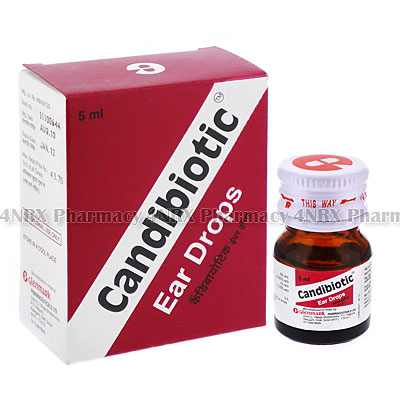 |
Home  Allergies Allergies  Candibiotic Ear Drops Candibiotic Ear Drops |
|
|||||||||
|
Candibiotic Ear Drops
What is Candibiotic Ear Drops used for? Candibiotic Ear Drops (Chloramphenicol / Beclomethasone Dipropionate / Clotrimazole / Lignocaine HCL) are used to treat fungal or bacterial infections of the middle ear and outer ear, known as otitis media and otitis externa respectively. This drug contains antifungal and antibacterial drugs in an oil base, which together help to kill various types of infection. It also contains lignocaine, which is a local anesthetic that helps to relieve pain caused by ear infections. How should I use Candibiotic Ear Drops? Candibiotic Ear Drops (Chloramphenicol / Beclomethasone Dipropionate / Clotrimazole / Lignocaine HCL) are applied into the ear directly. The patient should tilt their head sideways, and look upwards, while applying the prescribed amount of drops into the ear. The patients should then massage the earlobe gently to help the ears fully absorb the drops. It is important to keep the head tilted for 2 minutes after applying the ear drops. Patients should always consult their physician before using these ear drops, so that the correct dosage can be prescribed to them, and so that they can be advised on how long treatment is necessary. What are the side effects of Candibiotic Ear Drops? Some side effects have been reported by patients taking Candibiotic Ear Drops (Chloramphenicol / Beclomethasone Dipropionate / Clotrimazole / Lignocaine HCL) such as itching or burning sensations in the ears. Consult your physician immediately if any of these side effects persist or worsen, or if you notice any unusual symptoms after applying these ear drops. Please Note Strictly follow all instructions provided to you by your physician or pharmacist while using Candibiotic Ear Drops (Chloramphenicol / Beclomethasone Dipropionate / Clotrimazole / Lignocaine HCL). Optimum and safe dosage can differ based on the patient and the condition being treated. As this medication may be unsafe for certain patients, it is essential you always inform your physician if you are pregnant or breastfeeding, as well as if you have any allergies, other illnesses, or ongoing health conditions, and if you are taking any other form of medication, supplements, or herbal products. Immediately seek emergency medical care if you have any allergic or hypersensitive reaction. Common signs of a reaction include hives, swelling, skin rashes, chest pains, as well as trouble breathing or swallowing. 
|
|||||||||||||||||